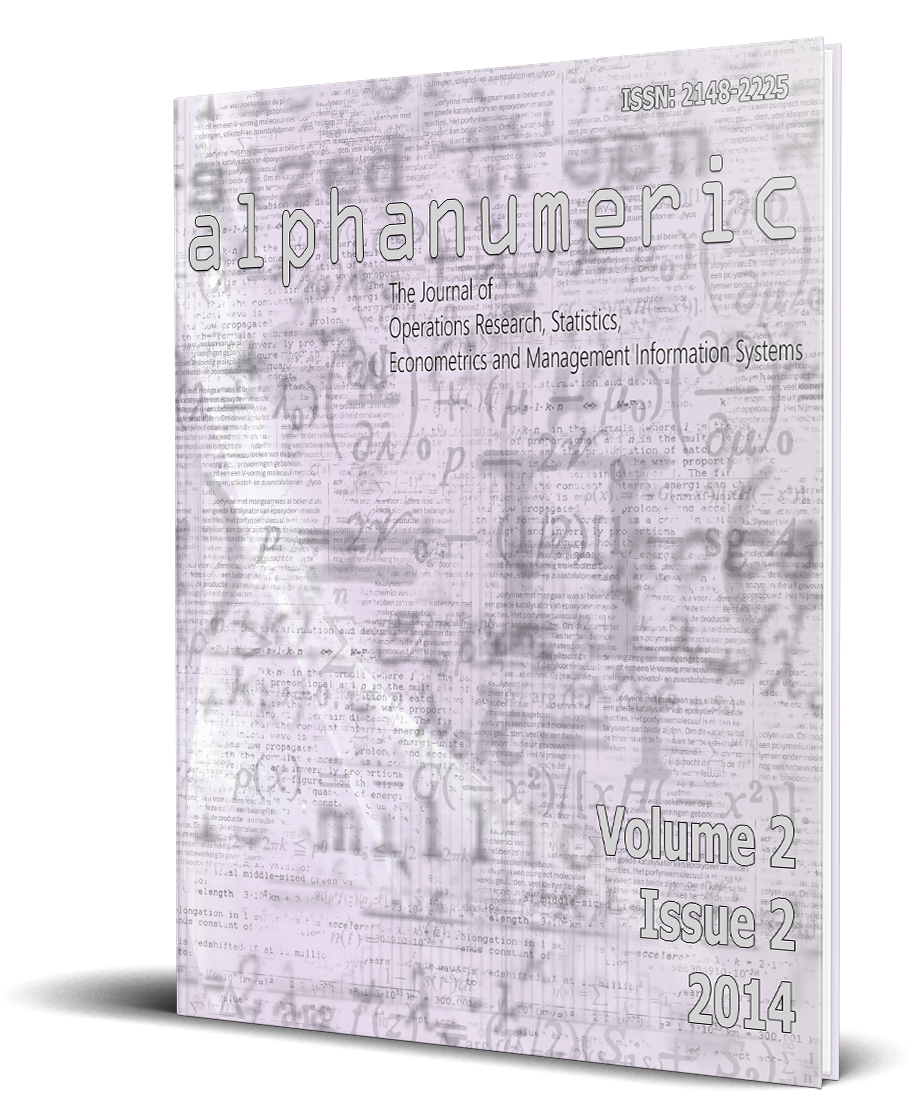
alphanumeric journal
The Journal of Operations Research, Statistics, Econometrics and Management Information Systems
The Impact of Information Technologies and Computer Usage On The Student Success In Accounting Courses
Abstract
In a globalizing world, along with the economic and technological developments, there is also a significant change in the structure of firms. This is in line with developments in all branches of science as well as the science and profession of accounting. Thus, important and serious changes in accounting are also observed. The mentioned changing environment for firms is reflected to the accounting education as well. So, adapting to changing circumstances is now a necessity. In order to understand accounting, the delivery format of accounting course to students is critically important and it is one of the most significant aspects. The aim of this study is to investigate the importance of accounting education, detect factors affecting accounting education and evaluate the information technologies’ as well as the computer usage’s influence on the success of students for accounting course.
Keywords: Accounting, Accounting Education, Education, Information Technologies, Management Information Systems
Jel Classification: I20, I21, M15, M41
Bilgi Teknolojileri ve Bilgisayar Kullanımının Öğrencilerin Muhasebe Dersindeki Başarısına Etkisi
Öz
Küreselleşen dünyada yaşanan ekonomik ile teknolojik gelişmeler aracılığıyla firmaların yapılarında köklü değişimler oluşmaktadır. Belirtilen gelişmeler doğrultusunda tüm bilim dallarında olduğu gibi muhasebe bilimi ve alanında da ciddi değişimler görülmektedir. Belirtilen durum hiç kuşkusuz muhasebe eğitimi için de söz konusu olmakta ve eğitimin farklılaşan durumlara adapte olmasını zorunlu kılmaktadır. Muhasebe dersinin anlaşılabilmesi için dersin verilme şekli en önemli unsurlardan birisidir. Bu çalışmanın amacı muhasebe eğitiminin önemini araştırmak, muhasebe eğitimini etkileyen faktörleri belirlemek ve değişen-gelişen ekonomik ile teknolojik koşullara bağlı olarak bilgi teknolojilerinin ve bilgisayar kullanımının öğrencilerin muhasebe dersindeki başarısına etkisinin değerlendirilmesidir.
Anahtar Kelimeler: Bilgi Teknolojileri, Eğitim, Muhasebe, Muhasebe Eğitimi, Yönetim Bilişim Sistemleri
Suggested citation
(). Bilgi Teknolojileri ve Bilgisayar Kullanımının Öğrencilerin Muhasebe Dersindeki Başarısına Etkisi. Alphanumeric Journal, 2(2), 77-97. http://dx.doi.org/10.17093/aj.2014.2.2.5000084658
References
- Arslan, M.L. , Seker, S.E. , Kizil C. , “Innovation Driven Emerging Technology from two Contrary Perspectives: A Case Study of Internet”, Emerging Markets Journal 03/2014; 3(3):87-07. DOI:10.5195/emaj.2014.54
- Bölükbaş, Z. (2013). Milliyet Gazetesi Blog, http://blog.milliyet.com.tr/egitimde-teknolojikullanimi/Blog/?BlogNo=14753.
- Bulun, M., Gülnar, B. ve Güran, Ö. (2004). Eğitimde Mobil Teknolojiler, The Turkish Online Journal of Educational Technology, s. 291-297.
- Çankaya, F. ve Dinç, E. (2009). Powerpoint ve Klasik Usulde Muhasebe Eğitimi Alan Öğrenciler Arasındaki Farklılıkların Tespiti: Karadeniz Teknik Üniversitesinde Bir Araştırma, Kocaeli Üniversitesi Sosyal Bilimler Enstitüsü Dergisi, s. 29-52.
- Civan, M. ve Yıldız, F. (2003). ,Globalleşme Sürecinden Muhasebe Meslek Eğitiminin Etkilenmesi, Muhasebe Denetimi Sempozyumu Bildirileri, Sayı: 6, s. 1-23.
- Coşkun, A. (2008). Akademik Web Sayfalarının Muhasebe Eğitiminde Yardımcı Kaynak Olarak Kullanılması, Muhasebe ve Finansman Dergisi, s. 154-157.
- Demir, B. (2012). Muhasebeye Yön Veren Gelişmeler ve Meslek Yüksekokullarında Verilen Muhasebe Eğitimine Yansımalar. Eğitim ve Öğretim Araştırmaları Dergisi, s. 109-120.
- Fidan, M. E. (2012). Üniversitelerde Muhasebe Dersini Powerpoint Sunumu ve Klasik Yöntem İle Alan Öğrenciler Arasındaki Farklar. Journal of Yasar University, Cilt: 25, Sayı: 7, s. 4283-4285.
- Hatunoğlu, Z. (2006). Muhasebe Eğitiminde Bilgi Teknolojisi Kullanımının Sunum Kalitesine Olan Etkilerinin Tespitine İlişkin Bir Araştırma. Muhasebeci ve Finansman Dergisi, s. 190-195.
- Karasioğlu, F. ve Duman, H. (2011). Meslek Yüksekokullarında Muhasebe Eğitimi ve Kalitesi Üzerine Bir Not. Gaziantep Üniversitesi Sosyal Bilimler Dergisi, s. 164-180.
- Kızıl, C., Arslan, M. L., Şeker, Ş. E., “An Accounting Viewpoint for the Relationship Between Intellectual Capital and Web Trends of BIST 30 Firms in Turkey”, Maliye Finans Yazıları Dergisi, Yıl: 28, Sayı: 101, Nisan 2014, ss.53-81.
- Korukoğlu, A. (1998). İşletmelerde Muhasebe Eğitimi ve Üniversitelerle İşbirliği. D.E.İ.İ.B.F. Dergisi, s. 13-24.
- Nedir.com - Bilişim Teknolojileri, http://bilisimteknolojileri.nedir.com/#ixzz2zpb7y700
- Özgöz, A. ve Üçüncü, U. Öğretimde teknoloji kullanma (laboratuar-atölye), Afyon Kocatepe Üniversitesi Sanal Eğitim Bilimleri Kütüphanesi – Prof.Dr.Mustafa Ergün, www.egitim.aku.edu.tr/ozgoz-ucuncu.ppt.
- Pastacıgil, A. ve Özbirecikli, M. (2008). Türkiye’de Muhasebeci Eğitiminin Gelişim Süreci: IFAC Standartları ile Mukayeseli Bir İnceleme, s. 83-85.
- Seferoğlu, S. S. (2010). Öğretim Teknolojileri ve Materyal Tasarımı, PEGEM Akademi, s. 70-75.
- Sürmen Y. ve Aygün, D. (2013). Muhasebe Çevresi ve Çevrenin Muhasebeye Etkisi. Gümüşhane Üniversitesi Sosyal Bilimler Elektronik Dergisi, s. 355-370.
- Tuti, S. (2005). Eğitimde Bilişim Teknolojileri Kullanımı performans Gösterileri, Öğrenci Görüşleri ve Öz-Yeterlilik Algılarının İncelenmesi. s. 1-5.
- Ünal, O. ve Doğanay, M. (2009). Lisans Düzeyindeki Muhasebe Eğitiminin Etkinliği: Sayıştay Özelinde Bir Çalışma, Sayıştay Dergisi, Sayı: 74-75, s. 117-138.
- Zaif, F. ve Ayanoğlu, Y. (2007). Muhasebe Eğitiminde Kalitenin Artırılmasında. Gazi Üniversitesi İktisadi ve İdari Bilimler Fakültesi Dergisi Ders Programlarının Önemi, s. 115-136.
2014.02.02.STAT.03
alphanumeric journal
Pages 77-97
Received: Sept. 15, 2014
Accepted: Nov. 5, 2014
Published: Dec. 31, 2014
2014 Kızıl, C., Şeker, ŞE., Bozan, D.
This is an Open Access article, licensed under Creative Commons Attribution-NonCommercial 4.0 International License.

scan QR code to access this article from your mobile device
Contact Us
Faculty of Transportation and Logistics, Istanbul University
Beyazit
Campus 34452 Fatih/Istanbul/Türkiye
Bahadır Fatih Yıldırım, Ph.D.
editor@alphanumericjournal.com
+ 90
(212) 440 00 00 - 13219
alphanumeric journal
alphanumeric journal has been publishing as "International Peer-Reviewed Journal" every six months since 2013. alphanumeric serves as a vehicle for researchers and practitioners in the field of quantitative methods, and is enabling a process of sharing in all fields related to the operations research, statistics, econometrics and management informations systems in order to enhance the quality on a globe scale.

